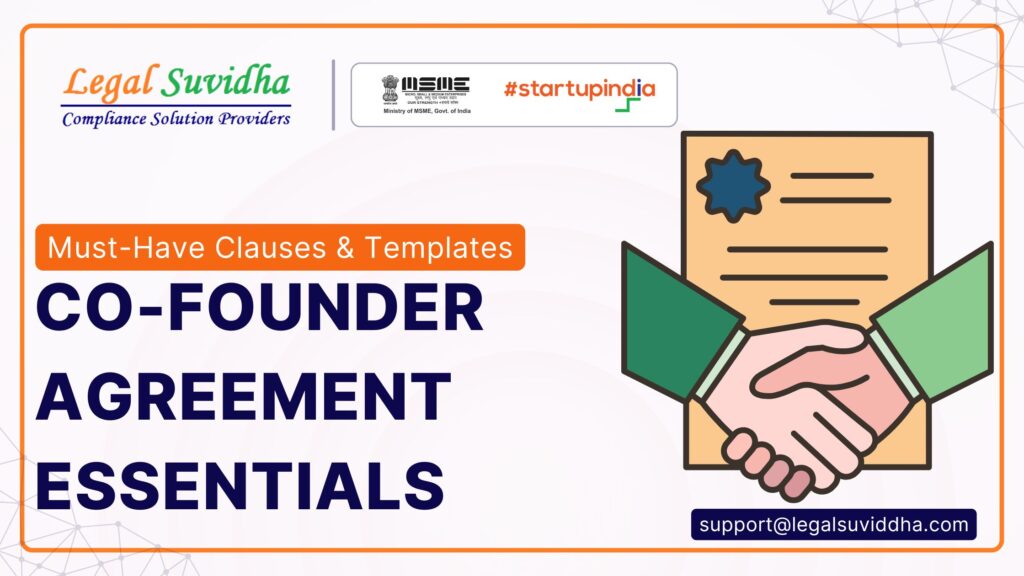Co-Founder Agreement Essentials: Must-Have Clauses & Templates
Why Every Startup Needs a Co-Founder Agreement
Starting a business with someone you trust — your friend, college mate, or ex-colleague — feels exciting. You’re sharing dreams, risks, and long nights of work. In that rush, legal paperwork like a Co-Founder Agreement often gets ignored.
But the truth is:
Most startup fights begin when things aren’t written down.
Verbal promises may feel enough, but when investors come in, money flows, or someone wants to exit — confusion starts. A Co-Founder Agreement is not just a formality; it’s the foundation of trust in writing.
When Friendship Wasn’t Enough
Let’s take a real-life example.
Ravi (tech guy) and Aman (marketing expert) were friends who launched a health-tech startup. They got some initial traction, an investor showed interest, and everything was going great.
Then came a simple question:
Who owns how much of the company?
Ravi said 70–30. Aman thought it was 50–50. There was no written agreement, only verbal talks.
Result?
The investor backed out.
The friends stopped talking.
The startup shut down.
One document — a Co-Founder Agreement — could’ve saved it all.
The Risk of Not Having a Written Agreement
Here’s what can go wrong without a Co-Founder Agreement:
Disagreements about equity split
Confusion over roles and decision-making
Problems when a co-founder wants to leave or sell shares
Fights over intellectual property
Legal issues if one founder joins a competitor
Even if you’re building a startup with your best friend, misunderstandings can (and do) happen. Without a legal agreement, your business can collapse overnight.
What a Co-Founder Agreement Should Include
A good Co-Founder Agreement should clearly define:
Equity & Ownership – Who owns how much of the company?
Roles & Responsibilities – What is each founder supposed to handle?
Vesting Schedule – Is equity earned over time or given upfront?
Exit Clause – What happens if someone wants to leave?
IP Ownership – Who owns the code, product, or idea?
Non-Compete & Confidentiality – What if someone joins a rival company?
Dispute Resolution – If there’s a fight, how will it be handled?
With these clauses in place, your startup can run smoothly even during tough times.
How Legal Suvidha Makes It Easy for You
At Legal Suvidha, we’ve helped 1,000+ startups create solid Co-Founder Agreements.
Here’s what we offer:
✅ Free Co-Founder Agreement Templates
✅ Custom Agreement Drafting for your specific business
✅ Same-day Delivery for urgent requests
✅ Expert Legal Advice from startup lawyers
✅ Clause Reviews if you already have a draft
You don’t need to hire a high-end law firm or spend weeks in confusion. We make it quick, affordable, and legally strong.
Your Next Step: Protect Your Startup Today
Right now, you have two options:
Option 1: Do Nothing
Assume things will always stay good. Trust verbal promises.
Risk: Your startup may collapse when problems arise.
Option 2: Contact Legal Suvidha Today
Let us help you draft or review a proper Co-Founder Agreement.
Protect your business before things go wrong.
Contact Legal Suvidha Now
Connect with our Domain Expert or reach out via WhatsApp for instant help.
Phone: 8130645164
Email: [email protected]
Website: www.legalsuvidha.com
Startup Compliance in India: The Ultimate 2025 Guide
Annual ROC Filings for Private Limited Companies
LLP vs Pvt Ltd: Which is Better for Your Startup?










